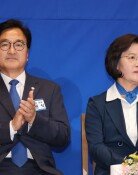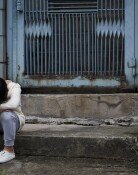Lee Myung-bak Reveals His Vision for the Next Administration
Lee Myung-bak Reveals His Vision for the Next Administration
Posted September. 10, 2007 07:48,
Through coming to power, Ill overcome the 1987 regime and launch the 2008 regime for Korea, said Grand National Party (GNP) presidential candidate Lee Myung-bak on September 9. The 2008 regime will be a New Growth Regime that will result in South Koreas rise as an advanced country.
On the eve of the last hundred days to the presidential election (December 19), candidate Lee held a press conference at his party office in Yeouido, Seoul, and said, I declare the remaining 100 days as the 100 days of a grand journey for a change of regime to achieve my historical calling.
2008 new growth regime-
In his 9·9 declaration, candidate Lee defined the presidential election this year as follows: one that judges ignorance that is unable to detect the changes of our time and incapability that brought about confusion to national affairs; one that puts an end to the self-complacence that splits the people, and one that should give birth to a competent government and a global president who will make the world his working stage.
He also set forth his plan for the revitalization of the economy and the integration of the people as the spirit of the time for the coming election, saying, For a decade, we were unable to move on. People are again urgently hoping for a change.
If the 1987 regime was the milestone that shifted South Korea from industrialization to democratization through the 6·29 democratization movement, he means to make the new regime of 2008 one that will turn South Korea into a developed country through economic growth, aiming to overcome the decade of negative growth and upgrade the nation as a whole by eliminating various splits engendered by reform surpluses.
Lee described the 2008 regime as a regime where the earnings from growth will be redistributed to the people, and one that will lay the groundwork for one of the finest countries in the world.
He introduced the core strategies of the 2008 regime as: the recovery of Koreas economic growth engine; building of a warmer civil society; a nation strong in human resources based on education revolution; pragmatic diplomacy with principles; building of an integrated economic community in Northeast Asia; and the expansion of the middle class.
Anyone is welcome-
For the remaining 100 days, Ill hold hands with anyone who agrees that a change of regime is best for Korea, said candidate Lee. Civil organization or politician, I wont mind. My work has already begun.
The GNP plans to construct an outskirt coalition with the characteristics of a headquarters for the nationwide movement which will link civil organizations hoping for a change of regime with exiles abroad into a network after the launch of his election camp early next month.
During a question and answer session with journalists regarding Cheong Wa Daes litigation against himself for the charge of libel, he said, Politics in South Korea are still third rate. Though this is my personal opinion, Ill respond to the prosecution investigation if necessary. But Ill discuss that with the party beforehand.
Concerning the South-North summit scheduled early next month, he answered, Im worried lest the president produce agreements that cause worries to the next government and people. On important agreements the president ought to persuade the people first before the North Korean leader Kim Jung Il.
Regarding the peace regime of the Korean Peninsula which was mentioned during the Korea-U.S. summit, he answered that he agrees with it, but added, When North Korea abolished its nuclear weapons completely, including the existing ones and comes out into international society, a peace treaty will be signed for the elimination of military tensions, and then the U.S. and North Korea will be able to normalize their relations.
In relation to the issue of a constitutional amendment, he said, It cannot be done unilaterally by the political circle but requires an agreement among the people. Ill handle the issue carefully after collecting the opinions of the people on such issues as power structures.
taylor55@donga.com







